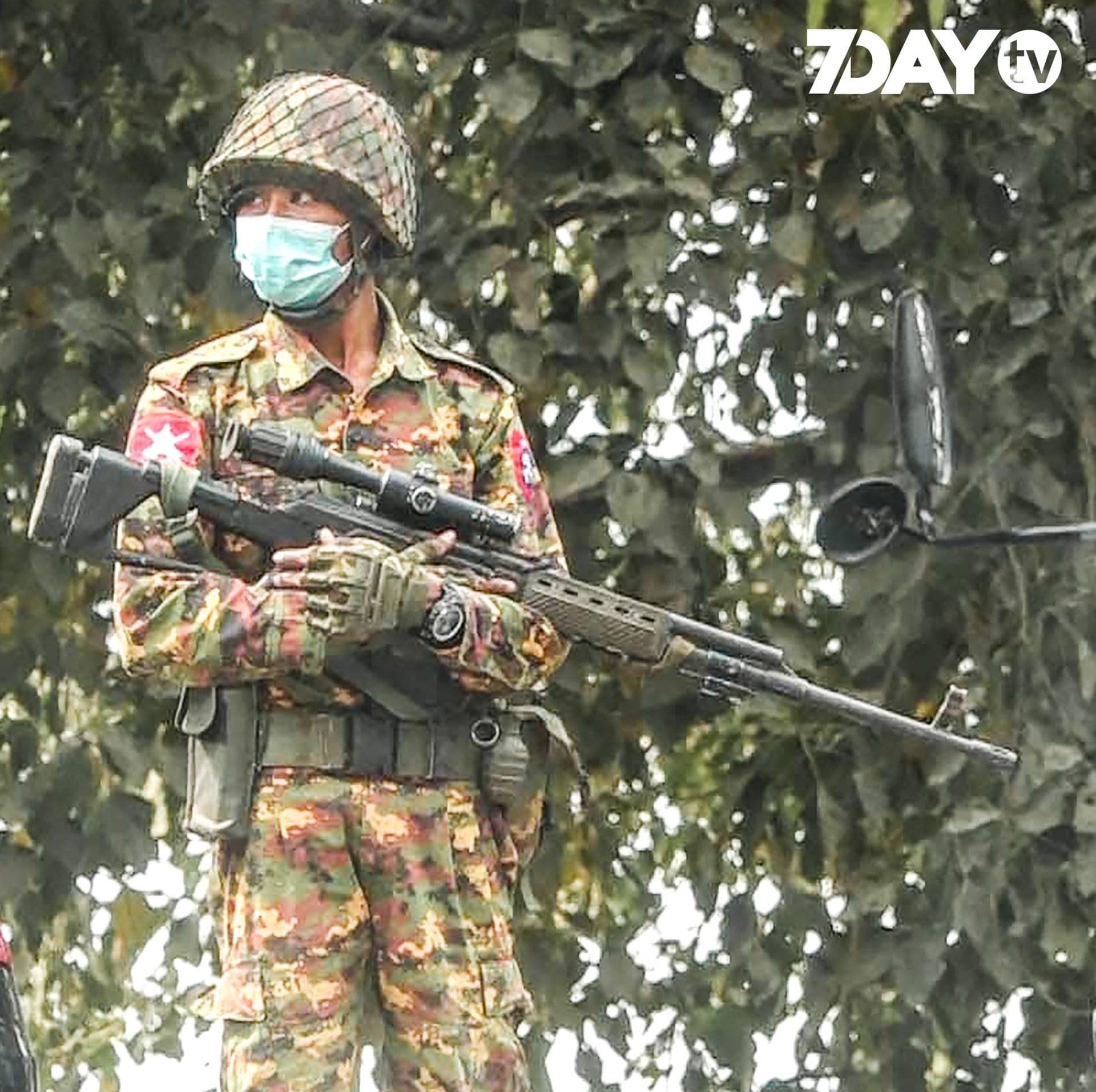YANGON—The Myanmar military regime used a Light Infantry Division that is responsible for mass atrocities against the Rohingya during a deadly crackdown on anti-regime protesters and civilians in Mandalay, according to the UN Special Rapporteur on Human Rights situation Myanmar.
At least two people, including a teenage boy, were shot dead when security forces shot live and rubber bullets into an anti-military regime crowd near a government shipyard on Sunday in Myanmar’s second biggest city. Many people were wounded.
The media and residents witnessed nearly 100 security personnel made up of soldiers and riot police in more than one dozen army trucks deployed on Sunday.
After the fatal attacks, the UN Special Rapporteur on Human Rights situation Myanmar, Tom Andrews, wrote on Twitter that the soldiers reportedly involved in the lethal Mandalay crackdown were from the 33rd Light Infantry Division—the same division responsible for mass atrocity crimes against the Rohingya in 2017.
Pictures taken by local media show troops on the scene dressed in camouflage with arm badges emblazoned with “33”.
According to a Reuters special report, the infantry division is among two units that took a leading role in the 2017 conflict that prompted 700,000 Rohingya to flee Myanmar following the troops’ clearance operation in western Myanmar. Many of them claimed arbitrary arrests, arson and killing by the soldiers.
The report said the 33rd Light Infantry Division led military operations in the village of Inn Din, where Reuters exposed a massacre of 10 Rohingya men and boys by soldiers and Buddhist villagers.
Following the Mandalay shootings, Andrews condemned “a dangerous escalation by the junta in what appears to be a war against the people of Myanmar.”
“From water cannons to rubber bullets to tear gas and now hardened troops firing point blank at peaceful protesters. This madness must end, now!” Special Rapporteur said.

Saturday’s deadly shooting saw Myanmar’s second and third protest-related fatalities since people across the country took to the streets on Feb. 6 to oppose the military regime. The military seized power from the country’s democratically elected government on Feb. 1.
The lethal attacks in Mandalay prompted instant international condemnation.
Governments from Western countries and Asia, and the United Nations condemned the crackdown and threatened further action against the Myanmar military and security forces for the arbitrary killing of civilians.
In response to the violent crackdown by the military regime, the US said that no one should be harmed for exercising their right to dissent, saying that it is “deeply troubled by the fatal shooting of protesters” in Mandalay.
Dominic Raab, the Foreign Secretary of the United Kingdom, said that the shooting of peaceful protesters in Myanmar is beyond the pale.
He said the UK will consider the further action with other international partners against the military regime, which is “crushing democracy and choking dissent.”
On Thursday, the UK imposed sanctions on Defense Minister General Mya Tun O, Home Affairs Minister Lieutenant General Soe Htut, and his deputy, Lt Gen Than Hlaing, for their role in serious rights violations, following the coup in Myanmar.
The European Union also responded that it strongly condemned violence against peaceful civilian protesters by the military.
Josep Borrell, EU Minister for Foreign Affairs, wrote on Twitter, “I urge the military and all the security forces in Myanmar to immediately stop violence against civilians.”
He said EU ministers will discuss the latest events in Myanmar at the EU Foreign Affairs Council (FAC) meeting scheduled on Monday, to take appropriate decisions.
Denmark also called on the Myanmar military and police to refrain from violence against the peaceful demonstrators and civilians.
On Sunday, the Japanese government said it “strongly condemns” the Myanmar security apparatus for causing casualties among civilians, saying that using force with guns against peaceful protests can never be tolerated.
Press Secretary Yoshida Tomoyuki said that the Japanese government “strongly urges the Myanmar security apparatus to immediately stop resorting to violence against civilians.”
It said Japan once again strongly urges the Myanmar military to release those who are detained including State Counselor Daw Aung San Suu Kyi and to swiftly restore Myanmar’s democratic political system.
Moreover, the Ministry of Foreign Affairs of Singapore said, “We are dismayed by the reports of civilian casualties” in Mandalay following the use of lethal force by security forces against demonstrators in Myanmar.
It said that the use of lethal weapons against unarmed civilians is inexcusable, adding that Singapore strongly urged the security forces to exercise the utmost restraint to avoid further injuries and loss of lives, and take immediate steps to de-escalate the situation and restore calm.
“The authorities must prevent further violence and bloodshed,” it said
UN Secretary General Antonio Guterres said that he condemns the use of deadly violence in Myanmar, saying that the use of lethal force, intimidation and harassment against peaceful demonstrators in unacceptable.
In response to the coup and violence against civilians in Myanmar, Human Rights Watch (HRW) urged that countries immediately impose targeted economic sanctions, global travel bans, and asset freezes on all members of the cabinet and State Administrative Council (SAC), and the military business conglomerates Myanmar Economic Holding Corporation (MEHL) and Myanmar Economic Corporation (MEC). Moreover, it urged sanctions on the entities’ subsidiaries and all directors and officers of military conglomerates.
HRW also called on the United Nations Security Council to impose a global arms embargo.
The measures should block the direct and indirect supply, sale, or transfer of all weapons, munitions, and other military-related equipment, including dual-use goods such as vehicles, communications, and surveillance equipment, as well as the provision of training, intelligence, and other military assistance, HRW said.
HRW also urged that countries should call on Russia and China to cut their sales and assistance to Myanmar, as well as Ukraine, Turkey, and Israel.

















